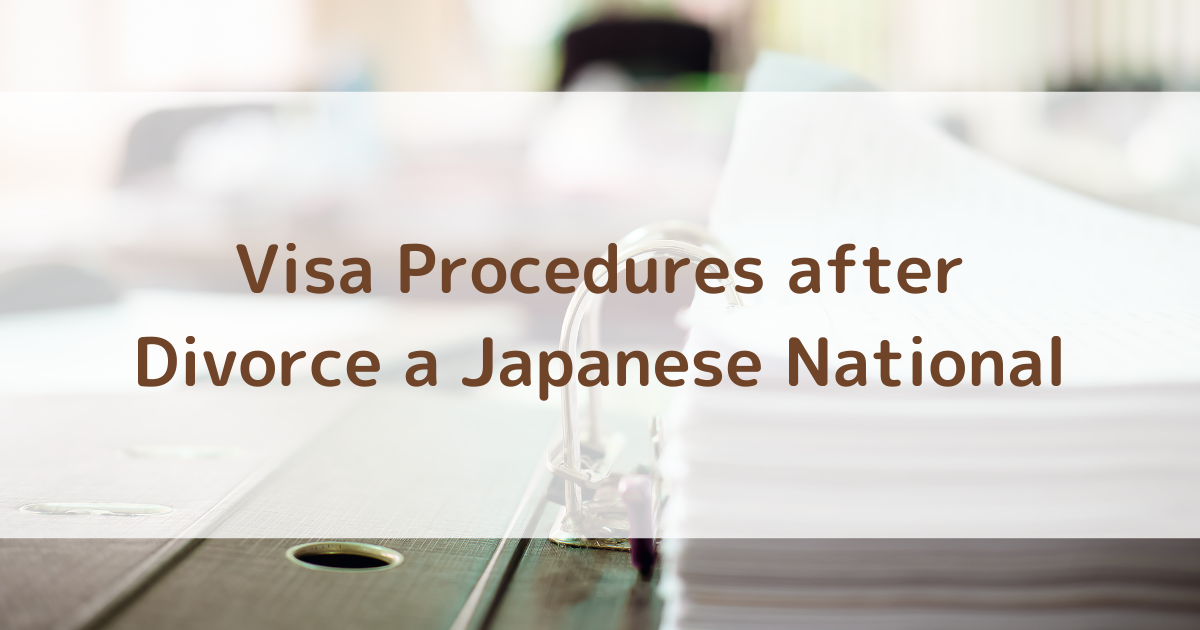
In the case of visas such as “Spouse or Child of a Japanese National”(「日本人の配偶者等」), “Spouse or Child of a Permanent Resident”(「永住者の配偶者等」) and “Dependent”(「家族滞在」), it is basically a prerequisite that the couple lives together. Although there is a diversity of working styles and values, there needs to be reasonable grounds for separation and careful handling of the situation. If you wish to separate in the course of your marriage, you may have your own circumstances. Depending on the reasons, renewal may be possible. This part explains the reasons why separation is not desirable and the cases in which it may be granted.
Marriage-related family visa status assumes cohabitation.

Marriage-related family visas (e.g. ‘Spouse or Child of a Japanese National’, ‘Spouse or Child of a Permanent Resident’, ‘Dependent’) require the couple to be living together. Even if they are living together when the visa is granted, if they are living separately for various reasons, they may not be able to renew their status of residence.
Immigration Service Agency and the courts’ definition of ‘married life’.
Many couples consider separating for various reasons, such as diversification of values and working styles, or because they are considering divorce. In the case of ‘Spouse or Child of Japanese National’, ‘Spouse or Child of Permanent Resident’ and ‘Dependent’, one of the requirements is that the lawful marriage continues, i.e. it is not a ‘sham marriage’, but ‘separation’ is a different issue.
In the past, applications for conversion to a spouse visa or renewal of duration have been refused due to separation, and court cases have been held about this.The court decision will form the basis for the subsequent approach to the review.
The status of “spouse or child of a Japanese national” or “spouse or child of a permanent resident” grants permission to stay in order to “carry out activities as a spouse (wife or husband)”, but the courts have ruled on the definition of “carrying out activities as a spouse (wife or husband)” in this way.
The reason why a foreign national who intends to engage in activities as a spouse of a Japanese national may obtain the status of “spouse of a Japanese national” is understood to be based on the fact that the foreign national intends to engage in activities in Japan as a person who has a special status of marriage with a Japanese national, the essence of which is to live together. By the way, even in cases where the marriage relationship continues to exist legally, if one or both spouses have already definitively lost the above intention and have come to lack the substance of their joint life as husband and wife, and there is no prospect of their recovery, the marriage should be considered to have lost its substantial basis in social life. ( Supreme Court of Japan, 1986 (O) No. 260, judgment of 2 September 1987, vol. 41, no. 6, p. 1423; Civil Code, vol. 41, no. 6, p. 1423).
It is reasonable to conclude that even if a foreign national has a legally subsisting marriage relationship with a Japanese national, if that marriage relationship has lost its substantial basis in social life, his/her activities cannot be regarded as those of a person with the status of spouse of a Japanese national. In this way, the above-mentioned foreign national cannot be said to have the requirements to acquire the status of “spouse of a Japanese national”.
Decision of the Supreme Court of 17 October 2002, case of request for revocation of the disposition of non-approval of application for change of status of residence.
Following this decision, the Immigration Service Agency also states in its examination guidelines that it is not enough for a couple to be legally married, but that they must live together and mutually help and support each other in their married life.
Can I renew the period of stay if we live separately but have the same residential address on the certificate of residence?
‘We are living separately (or considering it), but as long as we have the same residential address on the certificate of residence, is that okay?’
This is a frequently asked question, and this is a bad state of affairs. Making an application that does not correspond to the actual situation is a ‘false application’. A false application is a crime of ‘Illegal acquisition of status of residence (Immigration Law, Article 70, Paragraph 1)’ or ‘Aiding and abetting the illegal acquisition of status of residence for profit (Immigration Law, Article 74-6)’ and carries a penalty of up to three years’ imprisonment or a fine of up to three million yen, or both. In addition to this, the offence is grounds for revocation of status of residence, and the offender must leave the country or be subject to deportation.
‘Immigration Service Agency doesn’t investigate the actual situation, so they won’t find out?’
This is also often asked, but once a lie is told, it will always be contradicted in subsequent life and applications. And they will always be found out. It depends on the reason why you want to separate, but if your marriage has broken down, especially if you are considering divorce, you should prepare for the next step, such as changing your status of residence, if you want to continue to live in Japan.
If we separate, can I stay in Japan any longer?
It is systematically possible to change from a status of residence such as “Spouse or Child of Japanese National”, “Spouse or Child of Permanent Resident” or “Dependent” to another status of residence, and if you can change your status, you can continue to live in Japan.
This depends on the reason for the separation, but in some cases it may be better to change to a different status of residence.
For example, if both spouses are working and want to live separately for a long period of time for work reasons or values, it may be better to change to a work visa if they meet the requirements for a work visa. In addition, in the case of divorce, the status of residence of ‘Long Term Resident’ may be granted if the couple has been married in Japan for a long time up to that point, or if they are raising and taking care of their (married) Japanese children in Japan.
Separation may be permitted in unavoidable circumstances.

If there are compelling circumstances or ‘reasonable grounds’ for separation, renewal of the period of stay may be granted.
Examples where separation may be permitted
The following are examples of cases where a renewal of period of stay may be granted on the grounds that there are ‘reasonable grounds’. In the examination of “spouse or child of Japanese national” or “spouse or child of permanent resident”, the examination is conducted from the perspective of living conditions, income, compliance with laws and regulations, etc. Therefore, even if the following applies, there may be cases where the application is not granted. If you are considering separating as a ‘Japanese spouse etc.’, it is advisable to consult an administrative scrivener or lawyer who deals with family visas.
・Temporarily separated to give birth in home country
・Temporary separation to care for parents
・During divorce mediation or divorce proceedings
・If you are subjected to violence by your spouse
If you work temporarily away from your home for work , you need to have a ‘reason why you have to work alone’. For example, for the child’s education or to care for a parent. It should be considered that “transfer” alone is basically not sufficient as a reason for separation.
A temporary return home, such as to care for a family member or to give birth or be hospitalised in the home country, may be accepted as a ‘reasonable cause’ if the couple’s relationship has not broken down. Separation may also be recognised in the case of a ‘child’ rather than a spouse, who is going to live on his/her own, e.g. to university. In any case, when extending your period of stay, it is advisable to submit a solid written explanation in addition to your application documents.
*It is recommended that you consult with the competent Immigration Service Agency before separating.
Even if renewal is granted, the period of stay may be short.
If you have been separated for a long period of time, even with reasonable grounds, you may be granted a shorter period of stay even if you are able to renew your status.
For example, in the case of the ‘spouse or child of a Japanese national’ or ‘spouse or child of a permanent resident’ who is undergoing divorce mediation or in divorce proceedings, the period of stay is granted for ‘six months’.
Conclusion

The above explains the effects of living separately and the cases in which separation is permitted for those who are staying with a status of residence (visa) that is applied for on the grounds of marriage, such as ‘Spouse or Child of a Japanese National’, ‘Spouse or Child of a Permanent Resident’ or ‘Dependent’.
Immigration Service Agency basically grants family visas on the premise that the couple (family members) are living together. There may be various reasons for separation, but depending on the reason, it may be better to change to another status of residence so that the couple can remain in Japan in a stable manner. In particular, if you are separating on the basis of divorce and wish to continue living in Japan, you should consider other statuses of residence (e.g. work visa or ‘Long Term Resident’).



